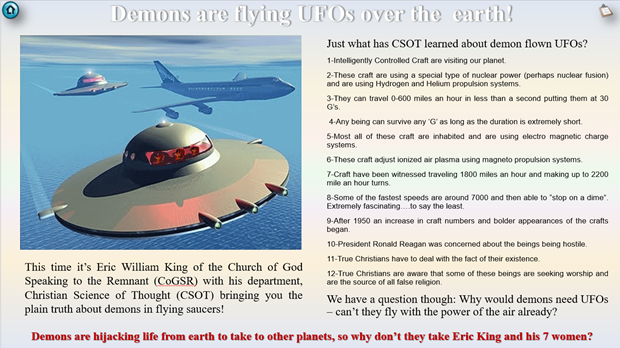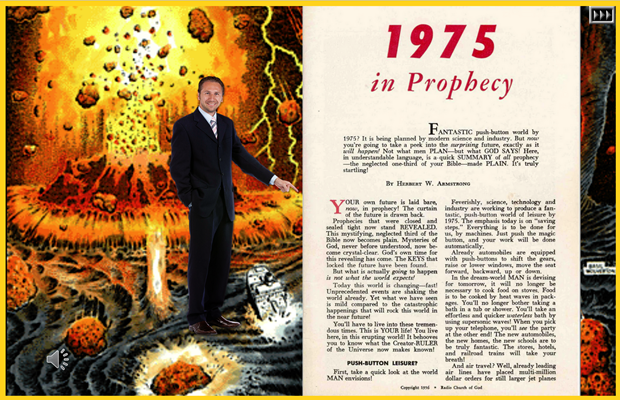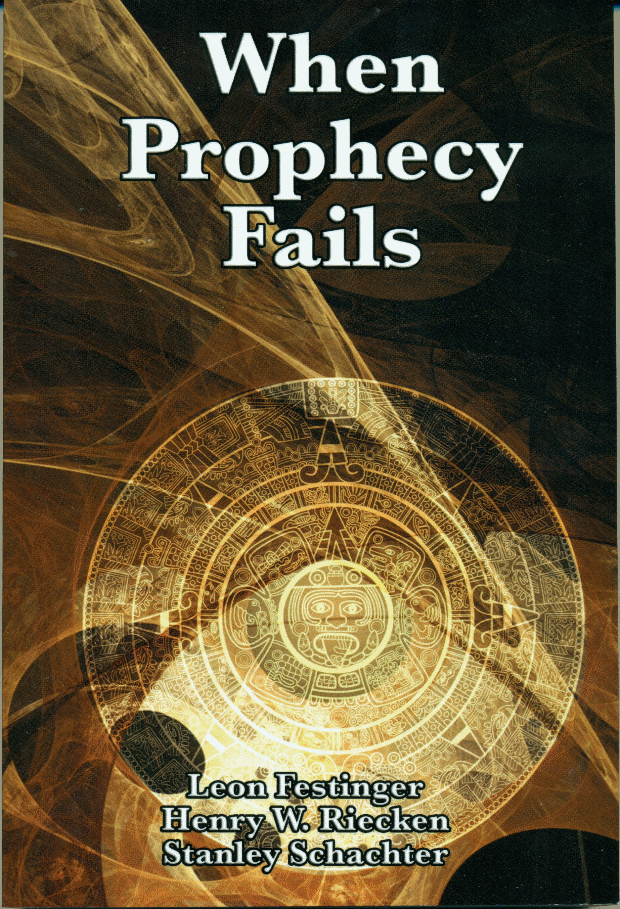I found this book by accident about 30 years ago, and have read it at least four times. I find it fascinating. In the 1970’s I knew two women in Albuquerque who were amateur psychics. They started bringing forth “space brethren messages” and eventually, although they failed to attract a following, they went up into the nearby mountains one night sure they would be lifted off before
the coming unspecified disaster. They waited, but no ship appeared. I think people inclined toward UFO beliefs haven’t changed much since this book was published. The basic data shown in this study can apply to religious or political groups as well. I am sorry it is out
of print, but if you have an interest in this field, get a used copy…the prices are reasonable and the book will not disappoint!
Support for the study was obtained
through the Laboratory for Research in Social Relations of the
University of Minnesota and help received through a grant-in-aid from
the Ford Foundation to one of the authors. The study is to answer the
how and why people take on new fervor when they have contradictory
evidence which they should not be able to avoid. There are five
conditions under which the authors would expect to observe the increased
fervor:
- A belief must be held with deep
conviction and it must have some relevance to action, that is, to what
the believer does or how he behaves.
- The person holding the belief must have
committed himself to it; that is, for the sake of his belief, he must
have taken some important action that is difficult to undo. In general,
the more important such actions are, and the more difficult they are to
undo, the greater is the individual’s commitment to the belief.
- The belief must be sufficiently
specific and sufficiently concerned with the real world so that events
may unequivocally refute the belief.
- Such undeniable disconfirmatory evidence must occur and must be recognized by the individual holding the belief.
The first two of
these conditions specify the circumstances that will make the belief
resistant to change. The third and fourth conditions together, on the
other hand, point to factors that would exert powerful pressure on a
believer to discard his belief. It is, of course, possible that an
individual, even though deeply convinced of a belief, may discard it in
the face of unequivocal disconfirmation. We must, therefore, state a
fifth condition specifying the circumstances under which the belief will
be discarded and those under which it will be maintained with new
fervor.
- The individual believer must
have social support. It is unlikely that one isolated believer could
withstand the kind of dis-confirming evidence we have specified. If,
however, the believer is a member of a group of convinced persons who
can support one another, we would expect the belief to be maintained and
the believers to attempt to proselyte or to persuade nonmembers that
the belief is correct.
Luckily, the authors found a group they
could observe during the study. A woman of a very religious persuasion
began writing messages she just ‘knew’ was from a contact in outer
space. This ‘source’ warned her to tell the world that there was going
to be a great flood to purge the world.

Licensed from Adobe Photo Stock; replication of this picture is a violation of copyright laws.
Along the way, she was told that those within the inner circle of her group would be rescued by flying saucers.

Licensed from Adobe Photo Stock; replication of this picture is a violation of copyright laws.
And in the end, we all know how that
turned out. They waited again and again to be picked up, but, alas,
there was no saucer shuttle and no flood. Yet, many of the group
continued to believe even after a number of disappointments,
illustrating the workings of the 5 premises. The people really did hang
on to their beliefs even after they had been demonstrated to be patently
silly.
Of course, those of you currently in the
Cult of Herbert Armstrong Mafia know perfectly well there are no such
things as flying saucers and the whole thing is patently silly on the
face of it.

Apparently there are some Armstrongists who believe in flying saucers.
Oops!
Just in case you Armstrongists get off the hook because you don’t believe in flying saucers, think again! The authors of When Prophecy Fails
spend over seven pages of the first chapter on William Miller! The
CoHAM should be getting mighty nervous. After all, those of us blogging
to refute Armstrongism have shown that the Worldwide Church of God and
its successors are cults. We’ve debunked British Israelism
and shown up the same sort of ‘prophecies’ ‘disconfirmed’ by the book.
There are no excuses. You Armstrongists are doing exactly what the study
predicts you would do. For example, consider the British Israelism Church of God: It has the gall to just make up excuses why DNA doesn’t disprove British Israelism.
The problem is that Y-Chromosome DNA has been found to be stable over
thousands of years and just doesn’t magically morph to some other
haplogroup. Idiots.
Then we need to consider Herbert Armstrong’s Prophetic Record:

Major fail. Again and again. And yet, people keep believing and making
up excuses, just like the study says. If you really want to be
embarrassed by what you believed, re-read 1975 in Prophecy:

Herbert Armstrong made some pretty bold prophecies. They simply didn’t
come to pass. Did you make excuses for the failure in 1975 when the
disconfirmation was too intense to ignore?

Ron and Laura Weinland — the two witnesses of the Church of God – Preaching the Kingdom of God (CoG-PKG
If there is any group that illustrates the truth of When Prophecy Fails,
it is the PKG. Ron and Laura Weinland — the two witnesses of the Church
of God – Preaching the Kingdom of God (CoG-PKG) — have conned the PKG
to continue giving them money even after their major prophecies failed…
again… and again. What’s worse, Ronald Weinland is currently serving his
sentence for felony Income Tax evasion, but the PKG membership sticks
with him and continues to make excuses.
Others, such as David Pack continue to
exhibit hoof in mouth disease — Dave prophesied a specific date that
three major leaders in the other churches of God would die and members
of all the ACoGs would come flocking to him. That was years ago and
still… nothing.
Now it is true that the Armstrongist
Churches of God have something that little group in the Midwest in the
1950s didn’t have. It would have been so much better after the flying
saucers failed to show and take them away from the flood that didn’t
happen if they had some way to find out how the various members of their
group fared after The Great Disappointment. They should have had the
benefit of some sort of periodic newspaper which had stories and
articles about the group and the individual members. They could keep up
much better, even if the editor didn’t particularly believe in the
tenets of the group and held the ‘floodists’ and ‘farmer UFOlogists’ in
contempt. He could still publish something called The Journal. Maybe out
of some town like say, Big Sandy. What’s important is not what the
group believes — what’s really important is to keep the social group
together in its completely delusional dysfunctional existence.
It’s called journalism.







